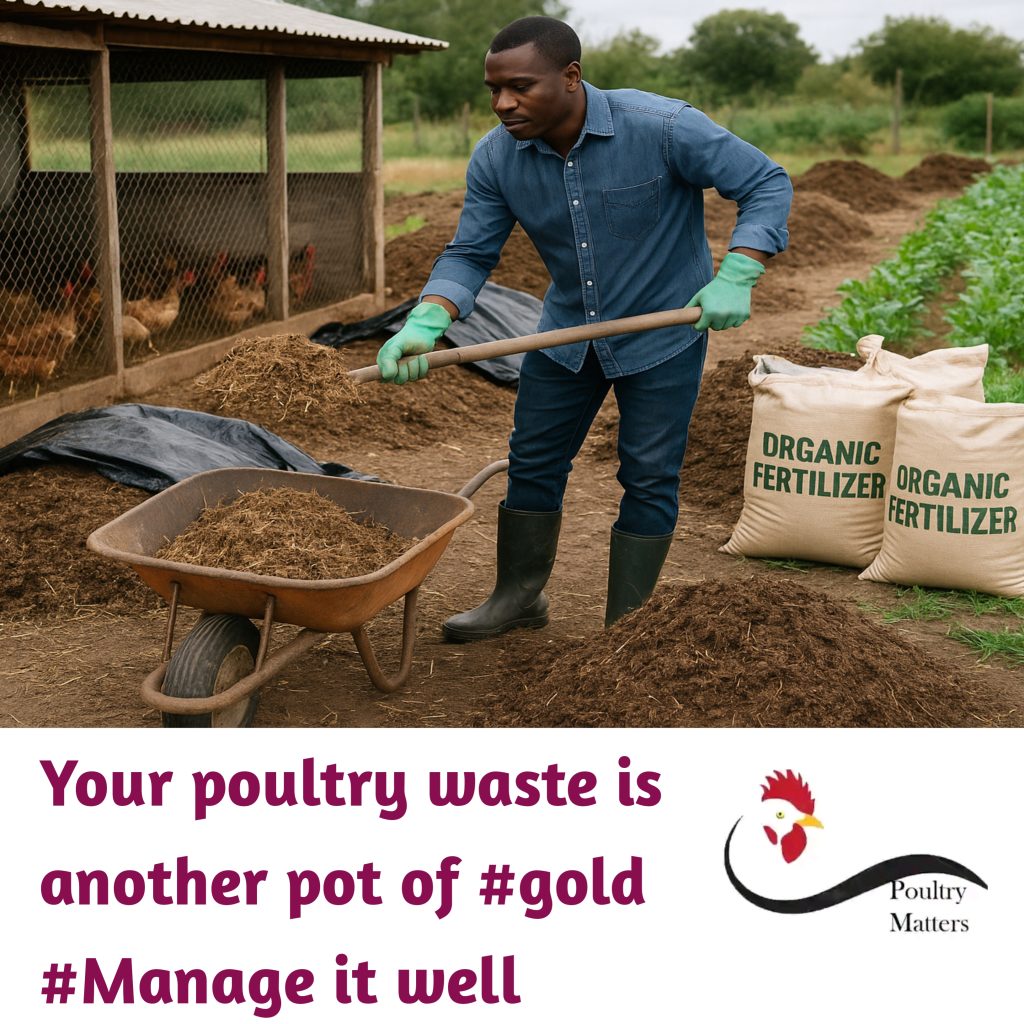Poultry Litters
Poultry litters refers to a mixture of bedding materials (like wood shavings or straw) spilled feed, feathers and dropping found on the floor of a poultry house. The litters help to keep the poultry floor dry by absorbing droppings and spilled water, thereby, improving the comfort of the birds and reduce the risk of disease. However, proper management of the litters is very important in the care of the flock – which is why the litter must be changed regularly. Litters are regularly changed to –
- Control ammonia build up in the poultry house
- Control moisture and ensure the poultry floor is dry and not damp
- Avoid the risk of disease among the flock, particularly respiratory disease(s)
Due to the large volume of straw or wood shavings needed to cover the poultry floor, as well as, the frequency with which the straws are changed, poultry litters is a major waste in poultry farming. However beyond covering of the poultry floor, litters is also a valuable by-product that can be recycled.
Smart reuse of poultry litters
While the poultry litters is often considered as a waste, in reality, it is also a valuable resource that can be recycled to improve the farm productivity, reduce cost and promote environmental sustainability. The litters can be recycled to give value as –
- Organic fertilizer
- Feed supplement
- Biogas production
- Compost for soil improvement
Organic fertilizers –
Poultry litters is rich in nitrogen, phosphorus and potassium. These are key nutrients for plant growth, which makes the litters an essential for crop farmers. Therefore, the poultry farm can earn additional income from selling the litters after drying it in sun for few days to crop farmers, rather than, disposing it as a mere farm waste.
Feed supplement for cattle –
Also, properly processed litters can be sold to cattle farmers.. Usually, the litters contain undigested feed minerals which can be low-cost protein and energy source for cattle feeding. However, it is important that the poultry litters is properly fermented or exposed to heating. The litters fermentation or heating is to kill harmful pathogen and parasites that could infect the cattle.
Biogas production
Furthermore, poultry litters can be processed into different type of biogas, one of which is Methane (CH4) -50 – 70% This is a components of energy gas which can be used for heating system on the farm. Biogas can be gotten from the poultry litters through the process aerobic digestion. Aerobic digestion is a biological process in which micro-organisms break down organic components in the litters.
NB – To create methane from the poultry litters, the poultry farm needs a biogas plant. The biogas may be a huge cost in the beginning but in the long-run it will assist the poultry farm significantly reduce cost on energy.
Compost for soil improvement
Poultry litters usually is rich in nutrients like Nitrogen, Phosporus, Potassium and Calcium. These nutrients when decomposed, produce humus-like nutrient rich material called compost. The compost is important to crop farmers, as it helps to improve the soil structure, as well as, support healthy root growth for the crops.
Benefits of recycling the poultry litters
Recycling your poultry farm litters is an environmentally friendly and economically-wise practice that transforms farm waste into valuable resources yielding extra “gold” to the farm account. Therefore, instead of discarding the litters, farmers can convert this waste into organic fertilizer enriching the soil an boosting the farm sustainability. The sustainable approach not only reduce pollution around the poultry farm area, it also earn the farm additional income making it a smart solution for proactive poultry farmers –
Provide additional stream of income to the farm –
Processed litters converted into compost, organic fertilizer, etc are sold to other farmers (particularly crop farmers) thereby, providing the poultry farm an extra source of generating income. This helps the farm to improve opportunities for better profitability.
Enhance the poultry farm sustainability –
Besides, recycling the litters aligns with sustainable agriculture, as it promotes resource efficiency and environmental protection.
Disease control –
Proper treatment of the litters through process like composting kills harmful pathogens, parasites and fly eggs. This significantly reduces the risk of disease spread on the farm.
Improved hygiene –
Processing the poultry litters reduces offensive odor, thereby, improving overall hygiene and comfort around the poultry farm.
Support effective waste management –
Recycling the litters improve on waste management effectively. It also prevents environmental pollution that may arise from improper waste disposal.
Challenges of poultry waste recycling
While recycling poultry litters offers many benefits , it comes with certain bottle-necks that the farmer must give proper attention, these bottle-necks include –
Improper handling of the waste –
Poor handling and management of the recycling process can lead to contamination of farm soil and water resources. . The contamination of the farm resources increases the risk of disease spread, thereby, making the farm area unsafe both for the flock and the people around in terms of their health status.
Regulatory restriction –
In additional, concern about the community resources has led to legislative restrictions in some areas – where individuals or private organizations are restricted from performing some waste management activities . Thereby, making it difficult for some poultry farms to embark on waste recycling.
Conclusion –
Recycling your poultry farm waste is a smart and sustainable practice that transform farm waste into valuable resources. Proper management of the litters recycling provide an extra income stream for the farm, contribute to environmental protection and farm sustainability.
Would you want some guidance on your poultry litters recycling, you can reach out to us.
We are your colleague, partner and friend in all poultry farming matters.
Read more on pouttry hygiene and consumer safety
https://poultrygist.com.ng/2025/05/poultry-food-hygiene-and-consumer-safety/

